

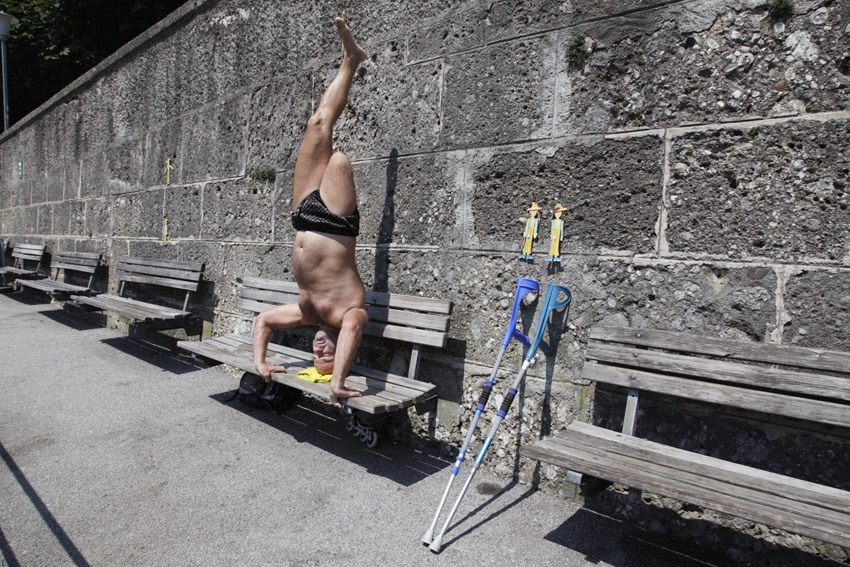
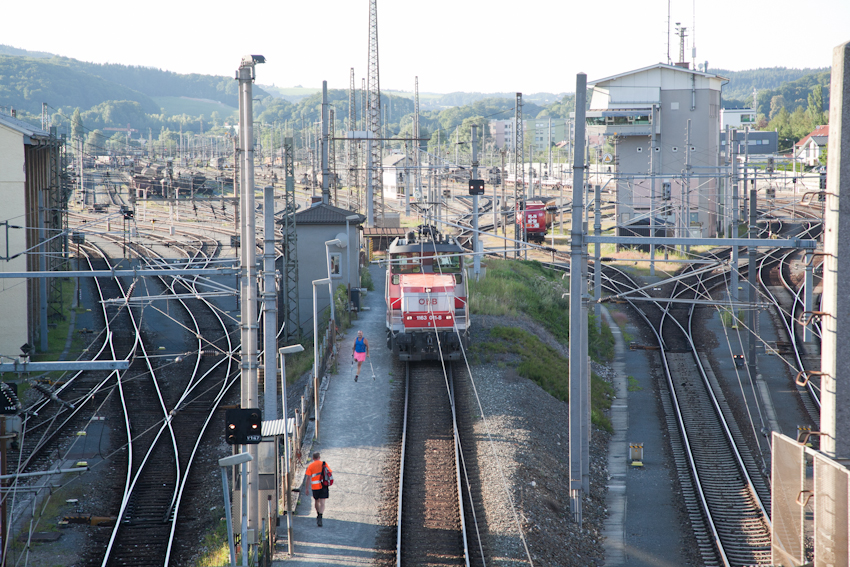
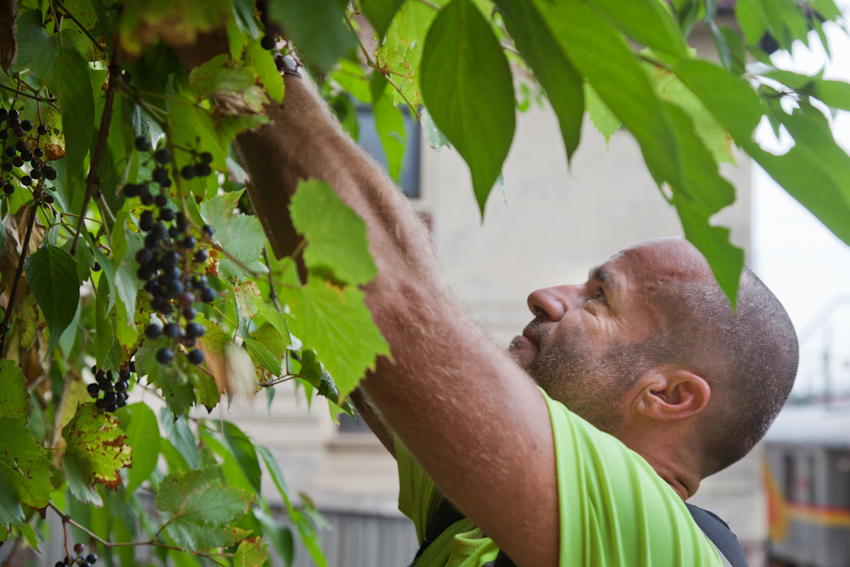

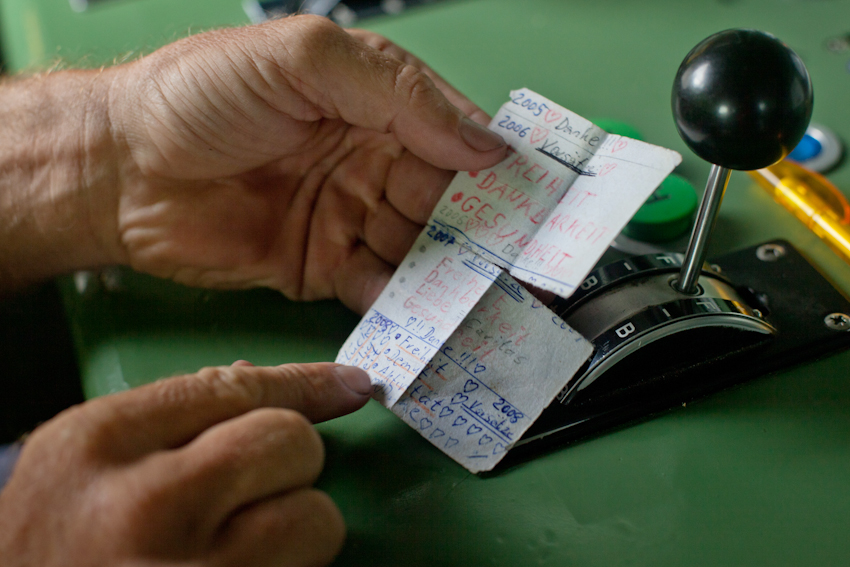
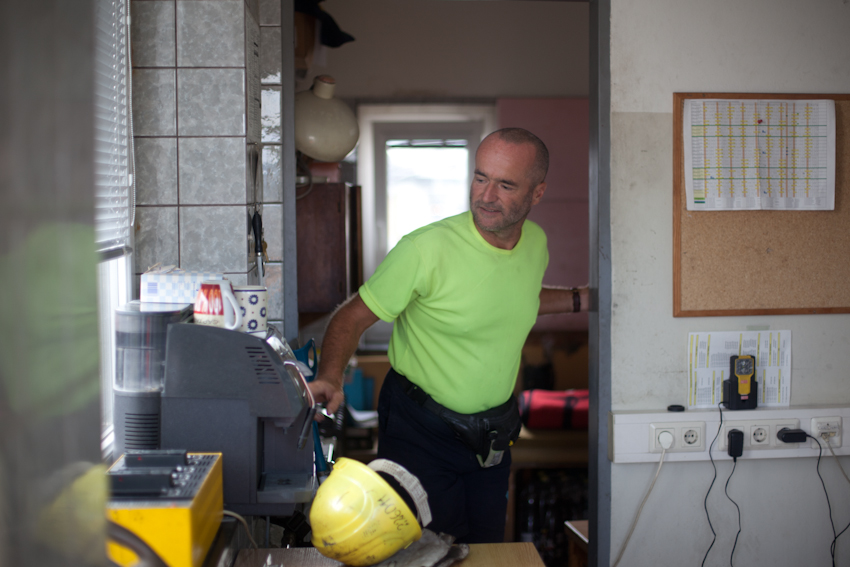
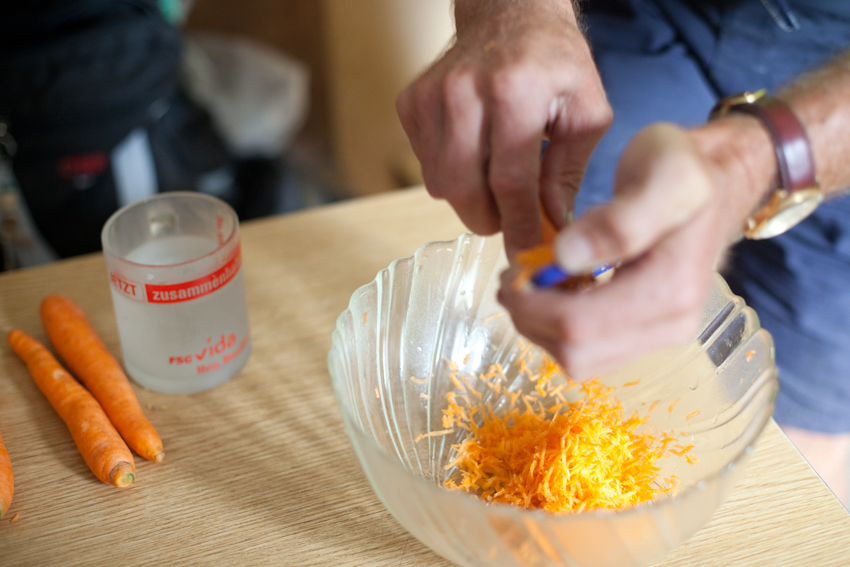
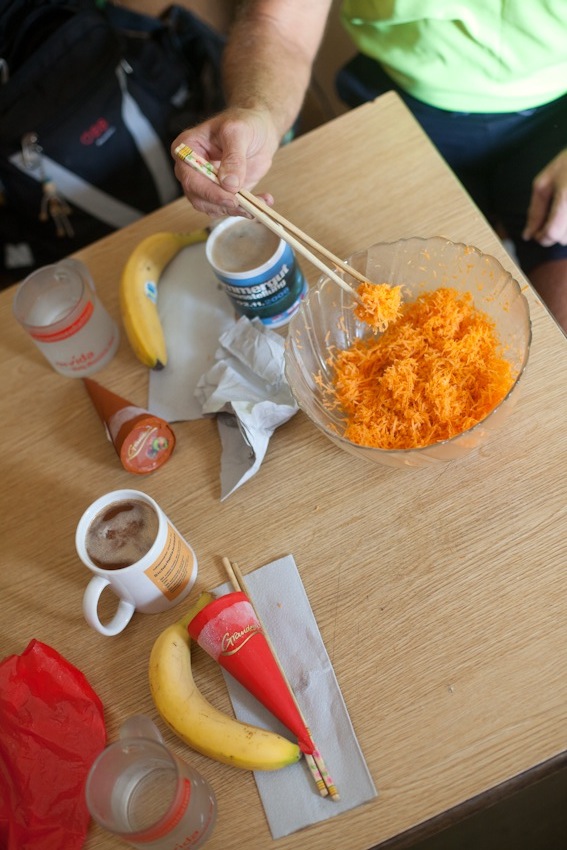


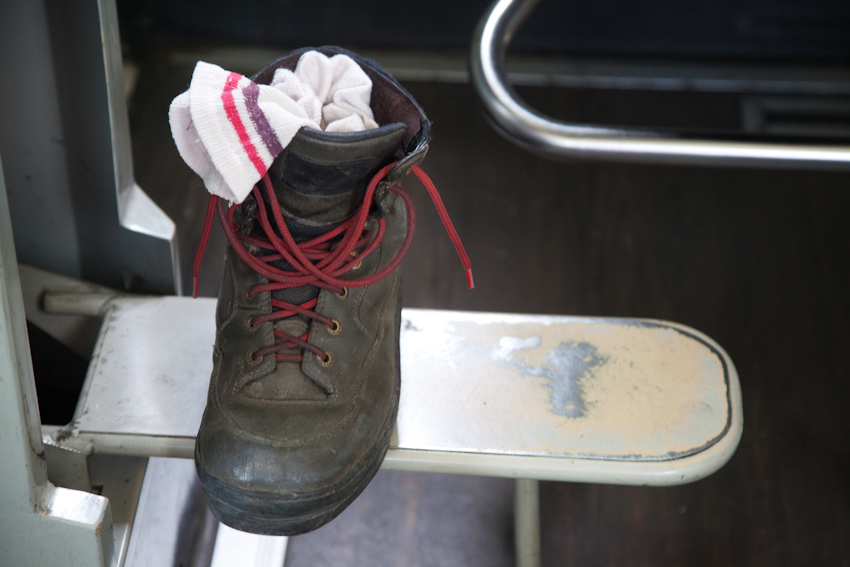
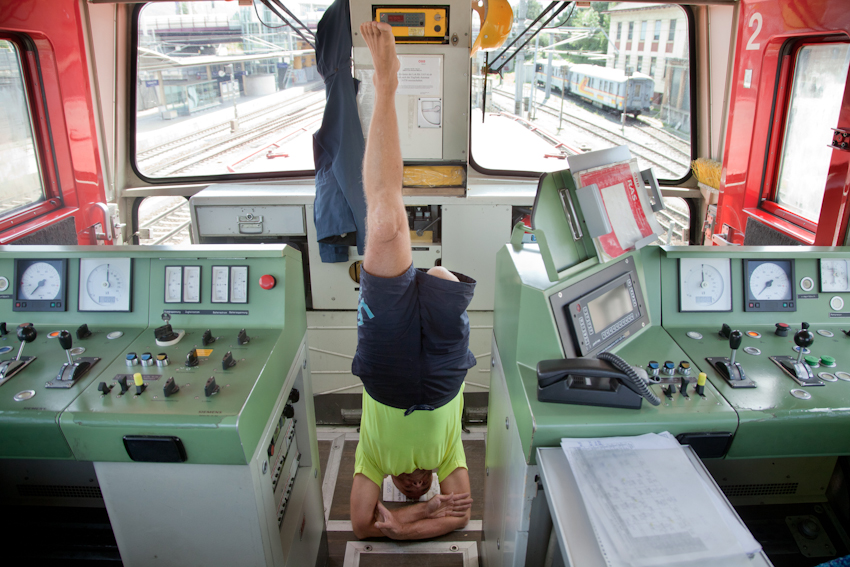
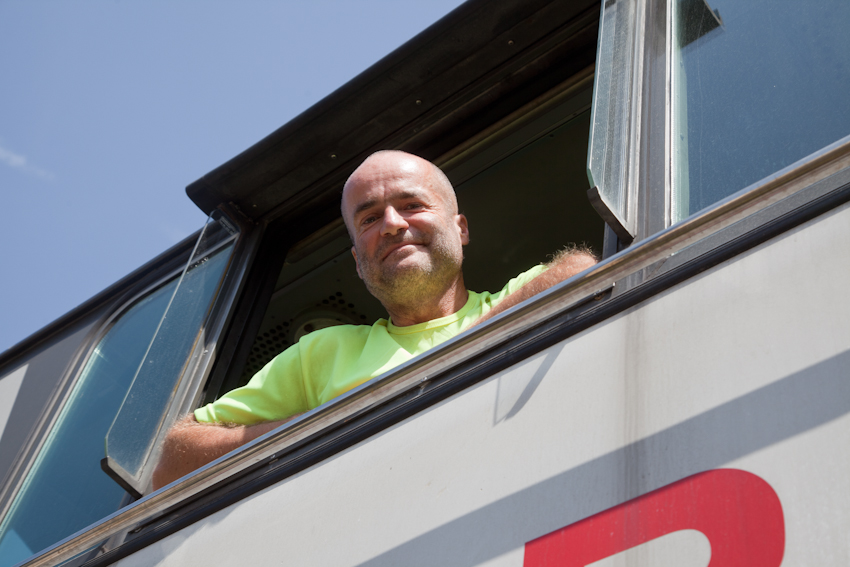



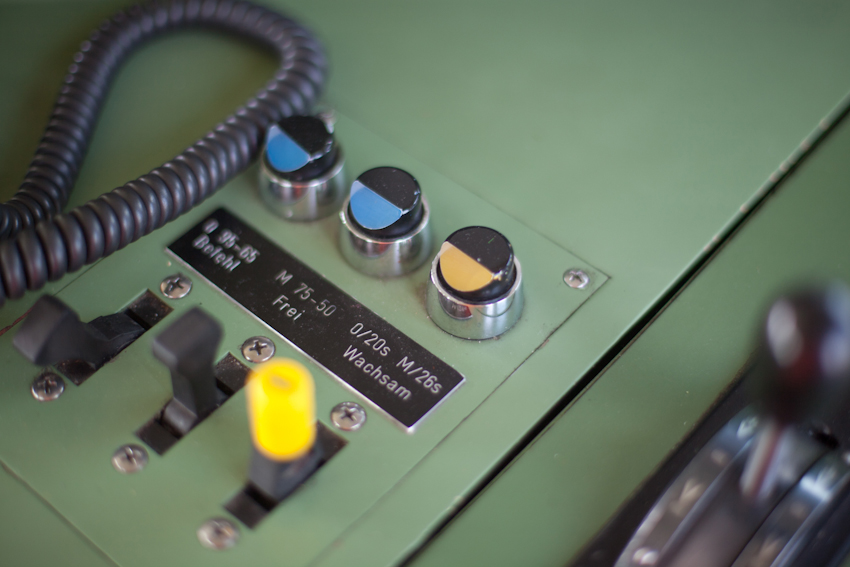

published by:
Apropos Straßenzeitung Salzburg, lejournaldelaphotographie.com
This is not the first time I’ve watched this man on his bench by the Staatsbrücke. He lies on his belly and seems to
sleep. I want to take a picture of him, but when I finally bring myself to ask him whether I might bother
him for a minute, he says no. Later, he tells me that he thinks it’s important to say No from time to
time, and that he had to learn that first, too. Well rested, he turns to me with a smile to tell me that I may
bother him now, and is excited by the idea of being photographed by me. Then he spontaneously does a
handstand on the bench!
Pauli from the Pongau is an engine driver. When he has to do night shifts and the weather is nice, he likes to lie
on this bench to bathe in the sun. It has been renewed and thus is not as rough and bent like the other
benches. His question to me: “Salzburg is a city of culture. Do you think it’s in bad taste to sit
topless in a city of culture?”, since a woman once mentioned this to him.
When we meet the next time, I’m picking him up from work. Pauli stands in neon pink shorts and neon orange
reflective vest on his blue roller-skate, supported by his two blue crutches in the middle of the bridge which leads
across the rails, as he’s waiting for me. The inn where we planned to go is closed, so he suggests that we
instead go to McDonalds, he hasn’t been there in ten years, and also because it’s close by. He makes an
effort to go slow on his inline skate, nevertheless I am barely holding up with him on foot. Luckily, I have
my bike with me, so I can ride along besides him.
We buy coffee, he pays, and in return I bring him the tray. As he talks, I notice his left eye: the iris is half
blue and half brown. When he laughs, a tooth gap becomes visible between his molars. He tells me that in
the beginning, he never dared to show his maimed leg in public. That he wore an artificial limb, which was
good for the distance between elevator and car, but when he walked with it for ten kilometers and then took
it off, sweat and blood poured out. It took some time for him to become confident enough to show his
crippled leg. He emphasizes how glad he is to have made the experience of the accident, that he is the happiest
man on earth. But I am unsure what to make of the sparkle in his eyes.
He wants to show me something, we walk towards the rails. While he emphasizes how much more he suddenly sees, now
that he drives slowly and not as fast as usual, I come close to running to be able to keep up. We come
across a beautiful castle, and then to a Romanian Orthodox church, carved entirely from wood and surrounded by
flowers in all colors and small fruit trees. On one side is fallow ground, filled with goldenrods. Pauli is
thrilled. He gushes about the goldenrod, and the bobby tops which grows along the edges, when he suddenly
plucks their flowers and eats them. Now I am intrigued and also sample a few bobby top flowers. They taste
of lettuce with a hint of cucumber. An employee of the church allows us to view the church from inside,
along with the vicarage, which also is built entirely from wood. Pauli relishes in the smell of sunflowers and
roses, before he has to leave for work again. I head towards the railway bridge, from where I can see him
stretching and doing a handstand before he enters his locomotive. He waves to me and drives off while
blowing the horn noisily.
Today I will go inside Pauli’s locomotive!
We meet again on the bridge across the rails. Today, Pauli wears a climbing boot instead of his roller skate. On the
way down to the rails, he plucks grape ivy from the edge of the bank and eats it, along with a handful of
grapes which he gives to me. We walk to his locomotive. He is very adamant about safety concerns, and
gives me strict orders not to step on the rails or wooden beams when they are wet, but only on the stones in
between. And to better look to the left and to the right one time too many. To hold onto the designated grip
when embarking, never to the door. When disembarking, not to overlook the lowest step.
After arriving inside the locomotive, he settles into his seat, puts his crutches into their spot and prepares for
driving by turning the machinery on, running inspections and making entries into the driver’s log.
While we push and pull freight trains, up the hump yard, down by themselves on the other side, he tells me about
roller skating in Thailand. Last year he skated 5000km in three months, on average 50km per day, on three
days even more than 100km. It is a kind of meditation, after 15km he gets a runner’s high, he feels like
floating above the ground. He simply gets up in the morning and drives in any direction, mostly on the
emergency lane of the highway. He sleeps in dormitories in youth hostels to meet interesting people… but he says
that most of them only go bed at three in the morning, when he’s already getting up again to roller skate.
When it’s time for his lunch break, we disembark and go to a shunter’s hut to eat. Pauli brought some rations, lunch
consists of: lukewarm water with a drop of peppermint oil – not the cheap one from SEWA, but the one for
27€ from the drug store! –, grated carrots eaten with sticks (a friend from Thailand showed him that), a
banana, coffee and some ice cream. Everything all at once, and prepared with love.
Then he tells me about his accident. He was traveling on his motorbike, when (most probably) he was experiencing an
episode of microsleep. He slid along the guard railing, which cut off his leg. First he thought, he cut
himself, though it seemed to him a cut while shaving hurts more. Some meters further along, he himself fell
off the bike which continued to roll along, and much later came to a stop virtually undamaged. When he was
told in the emergency ward what had happened, he used his hands to feel around the area where, only a few
hours ago, his leg had been. Naturally, his first thought was: “shit”. But immediately after this, he
asked himself: “What is the use of complaining? What is the use of crying and screaming? That doesn’t give me
my leg back.” And thus his subconscious formed the principle to always try to think positive. To which he
has adhered since.
He rummages around in his wallet and shows me an old, torn up bill. Since 2005, he writes down his New Year’s
resolutions. Resolutions like: happiness, love, freedom, health, thankfulness, humility, activity. He lives by
these resolutions, 100%.
Pauli is deeply religious. He was raised Catholic and goes to church on a regular basis, but he tells me that a Thai
once paid him the best compliment of all when he told him that he lives Buddhism. Pauli leads the humble life
of a monk, just as an engine driver. He tells me about his faith in one God, no matter what you call him,
but that you get reborn, and that there’s nothing worse that could happen to a soul than suicide. Because
the “remaining” years of life that one doesn’t get to live anymore, one has to spend in suffering. There’s
nothing to be done for such a soul than to pray for it. If you sin, you can at least atone for it in your lifetime.
Sometimes, Pauli meditates by writing with his left hand: At first strong and aggressively, then increasingly soft,
until no ink gets on the paper. He used to write and scrawl into diaries until the pages tore, then he
ripped them out, crumpled them up, unfolded them again and hung them up or at least collected them. These days,
he sometimes writes in his diary, but he gives his writings away, to people he trusts.
Because it is important to let go.
